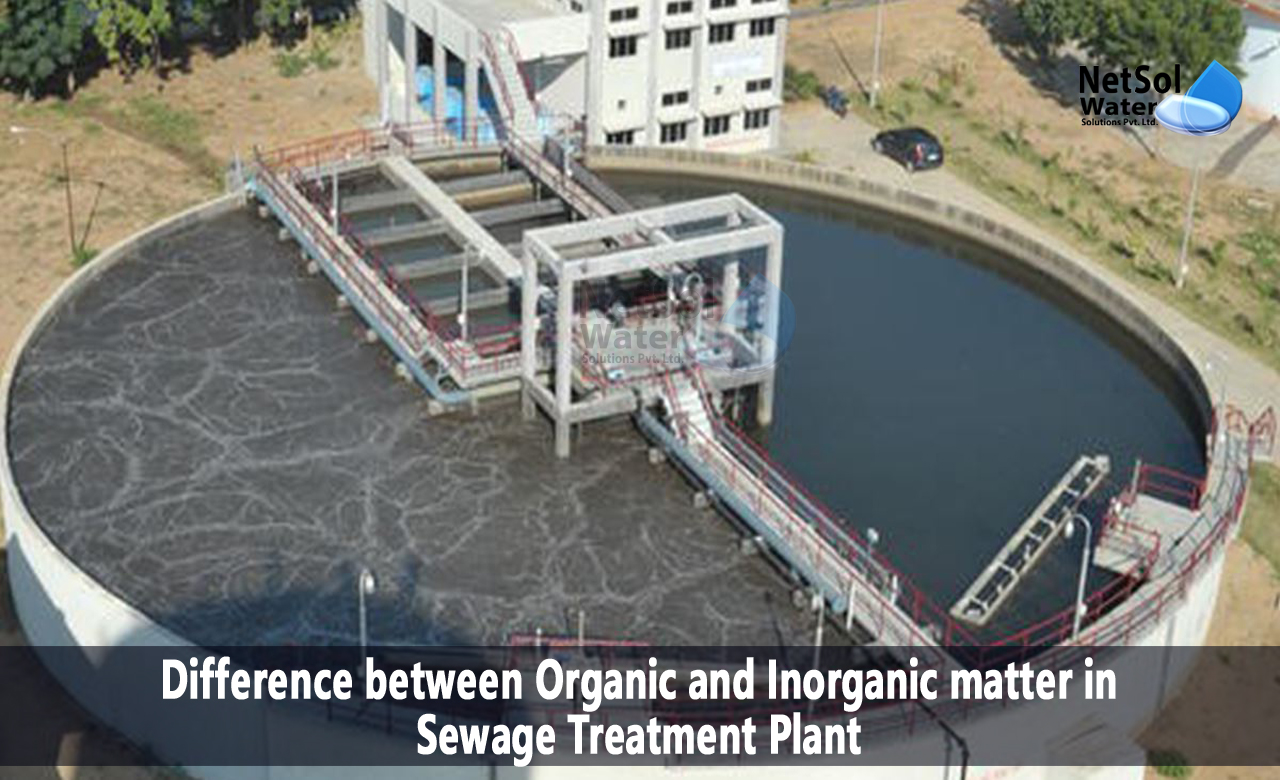Difference between Organic and Inorganic matter in STP Plant
Sewage treatment plants (STPs) are designed to remove contaminants and pollutants from the wastewater generated fromhouseholds, industries, and commercial establishments. The wastewater contains a mixture of organic and inorganic matter thatneeds to be treated effectively to make it safe for discharge into the environment.
Now, let us discuss the difference between organic and inorganic matter in Sewage Treatment Plants.
Organic Matter in Sewage Treatment Plant:
Organic matter refers to the carbon-based compounds that are present in the wastewater. Organic matter can be either biodegradable or non-biodegradable. Biodegradable organic matter can beeasily decomposed by microorganisms, while non-biodegradable organic matter cannot be decomposed easily.

Sources of Organic Matter in Sewage Treatment Plant:
Organic matter in sewage treatment plants can come from various sources such as:
1. Human waste: Human waste contains a considerable amount of organic matter in the form of feces and urine.
2. Food waste: Food waste contains organic matter in the form of leftover food and cooking oil.
3. Industrial waste: Industries such as food processing, paper, and chemical produce wastewater that contains organic matter.
Treatment of Organic Matter in Sewage Treatment Plant:
The treatment of organic matter in sewage treatment plants involves the following processes:
1. Primary Treatment: The primary treatment involves the removal of large solids and debris from the wastewater using screens and grit chambers.
2. Secondary Treatment: The secondary treatment involves the biological treatment of wastewater using microorganisms. The microorganisms decompose the organic matter in the sewage andconvert it into carbon dioxide, water, and biomass.
3. Tertiary Treatment: The tertiary treatment involves the removal of any remaining contaminants from the sewage using various physical and chemical processes such as filtration and disinfection.
Inorganic Matter in Sewage Treatment Plant
Inorganic matter refers to the non-carbon based compounds that are present in the sewage. Inorganic matter can be either soluble or insoluble.

Sources of Inorganic Matter in Sewage Treatment Plant:
Inorganic matter in sewage treatment plants can come from various sources such as:
1. Dissolved Solids: Dissolved solids such as salts and minerals are present in the sewage.
2. Suspended Solids: Suspended solids such as sand and silt are present in the sewage.
3. Metals: Metals such as copper and lead can be present in the sewage.
Treatment of Inorganic Matter in Sewage Treatment Plant:
Inorganic matter in sewage is treated through various processes that involve the use of physical and chemical processes to remove the pollutants from the sewage. The treatment processes forinorganic matter include the following:
1. Primary Treatment: The primary treatment involves the use of physical processes to remove large solids and debris from the sewage.
2. Chemical Treatment: The chemical treatment involves the use of chemicals such as coagulants and flocculants to remove inorganic matter from the sewage. The chemicals react with the pollutants and form larger particles that can be easily removed.
3. Secondary Treatment: The secondary treatment involves the use of biological processes to remove any remaining inorganic matter from the sewage.
4. Tertiary Treatment: The tertiary treatment involves the use of advanced treatment processes such as reverse osmosis, activated carbon adsorption, and ion exchange to remove any remaining inorganic matter and other pollutants from the sewage.
The treated sewage is then discharged into the environment or reused for industrial purposes.
Difference between Organic and Inorganic Matter in Sewage Treatment Plant:
· Composition: Organic matter is carbon-based compounds, while inorganic matter is non-carbon based compounds.
· Decomposition: Organic matter is biodegradable and can be decomposed by microorganisms, while inorganic matter is non-biodegradable and cannot be decomposed by microorganisms.
· Removal: Organic matter is removed through biological processes such as the secondary treatment, while inorganic matter is removed through physical and chemical processes such as sedimentation and coagulation.
· Sources: Organic matter can come from human waste, food waste, and industrial waste, while inorganic matter can come from dissolved solids, suspended solids, and metals.
Conclusion:
Organic and inorganic matter in sewage is two types of pollutants that need to be treated separately to ensure effective treatment.Organic matter is biodegradable, and it is treated through biological processes, while inorganic matter is non-biodegradable, and it is treated through physical and chemical processes. The treatment of organic and inorganic matter in sewageensures that the sewage is safe for discharge into the environment or reuse for industrial purposes.
Leading manufacturer of sewage treatment plants in India
Netsol Water is the leading manufacturer, supplier, and exporter of a quality selection of water treatment, and wastewater treatment products in India, by using advanced sewage treatment methods.
RO plants, water softeners, ETPs, STPs, DM plants, AMC, O&M, Ultra filtration, UV, Ozonation, ZLD plants, Anoxic tanks, and othergoods and services are available from us. We also provide services to businesses in sectors including automotive,pharmaceutical, textile, pulp & paper, beverages, refineries, schools, hospitals, office buildings, and hotels, amongothers.
Call us at +91 9650608473 or email at enquiry@netsolwater.com for further information.



